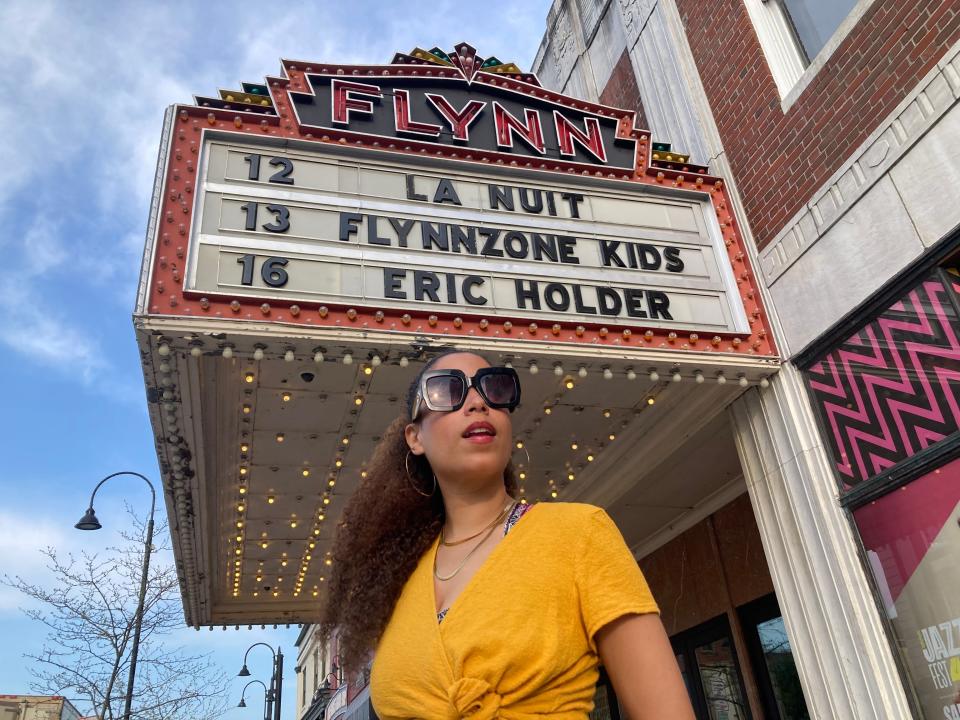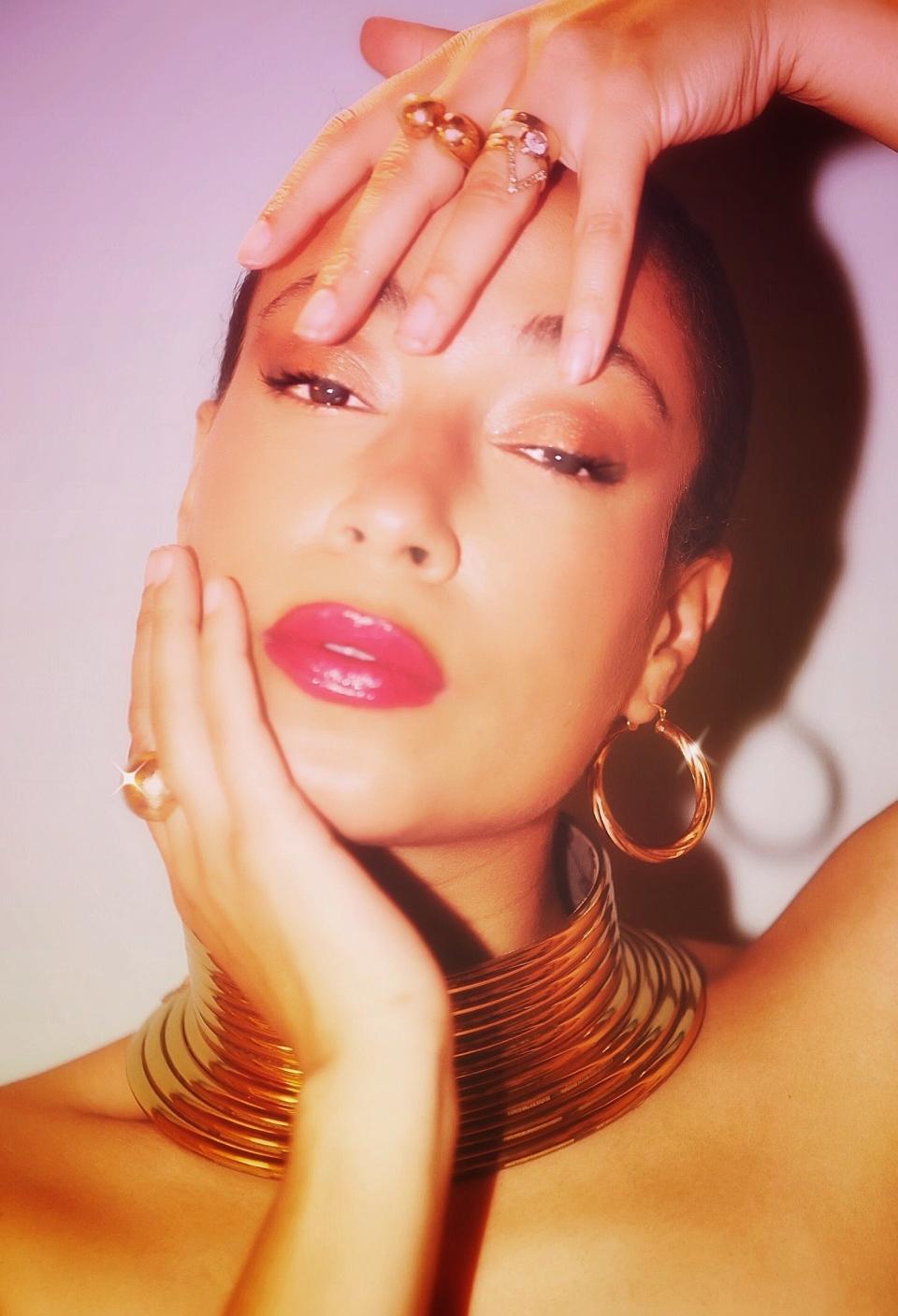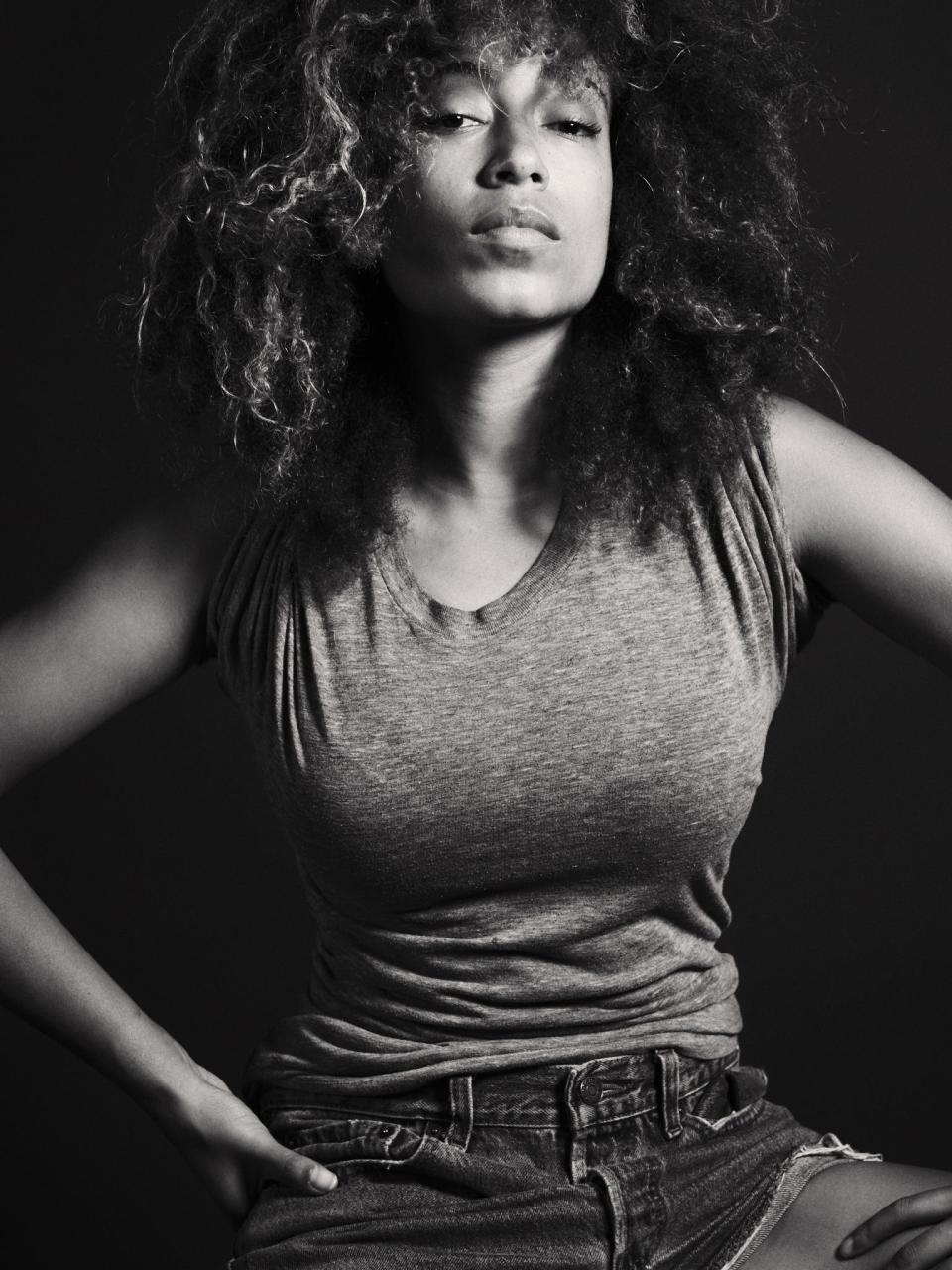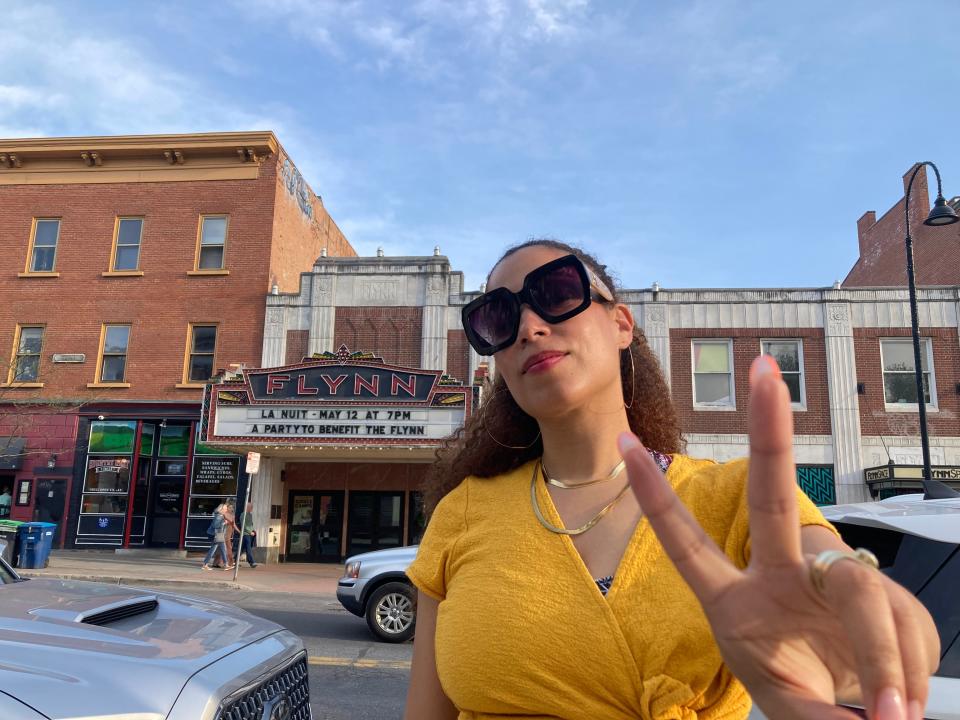Discover Jazz performer Myra Flynn has changed, by returning to her Vermont musical roots
A previous version of this article misidentified the name of the show Myra Flynn hosts and executive produces on Vermont Public.
Myra Flynn is changing.
In the past five years, the Vermont-raised musician married (Phil Wills, a celebrity mixologist from the TV show “Bar Rescue”), had a child (Avalon, who’s 3) and began a new high-profile job in her home state (host and executive producer of the Vermont Public show “Homegoings”). All of that means her music has changed, too.
Flynn plays what might be her biggest show ever on Sunday, June 11 – at the Flynn, of course - to conclude the Burlington Discover Jazz Festival. She’ll celebrate her new five-song EP, “Shadow Work” with musical guests from Vermont including Mike Gordon of Phish, saxophone player Joe Moore and guitarist Nick Cassarino.
Flynn, who splits her time between Vermont and Los Angeles, sat down recently at Leunig’s Bistro with the Burlington Free Press, a publication that once employed her, to talk with an interviewer with whom she worked closely. She discussed her musical career of 20-plus years and its various levels of ups and downs. She also talked about change, and how a lot of change can do a person a lot of good. (The conversation has been edited for conciseness and clarity.)

Flynn's big show at the Flynn
Burlington Free Press: How big is this show? What does it mean for you?
Myra Flynn: This show is the biggest deal to me. I of course grew up in Vermont and the Flynn main stage was only where you went for the most special of things… I have been after that place to have a little faith and trust in a local artist, to see if I can pull in that room, because I’m not the biggest star in the world but my audience loves me and I love them, you know, and they trust me and I trust them.
When I met (executive director) Jay Wahl from the Flynn, I was playing the KidZone Hour at the Flynn and he was in the audience and I was like, “Oh, you’re Jay Wahl, I gotta talk to you!” And we had a great conversation where he was kinda like, “Let’s be realistic.” I think he did his research, he wanted to see what my draw has been like in other places in some of the larger rooms I’ve played in in Vermont, like Higher Ground… He said, “What do you need?” and I said, “Well, what do you mean, ‘What do you need?’” He said, “No, you know, as an artist, what do you need to make this a good show? We have resources.”
I’ve just never had anybody ask that. It’s become really apparent to me that Jay has an agenda when it comes to that theater, and when it comes to the jazz festival the agenda is unlike any executive director or booker’s agenda I’ve ever met, which is to prioritize the presence of Black bodies on stage. When you ask him about that it doesn’t have anything to do with DEI (diversity, equity and inclusion) work, it doesn’t have anything to do with righting the wrongs of history. It has to do with most of the music we listen to has stemmed from Black music, Black people and Black culture. I love that. I love that he is just unabashedly just deciding to make this festival – this festival is hella Black, and I get to close it out as a Vermonter, as a Black Vermonter.
BFP: Last year’s (festival) was, too, which you were a part of at Leunig’s and elsewhere. We saw that was happening last year.
MF: Things have changed (with the festival), right? People are noticing things have changed. It’s shorter, right? But in my opinion it’s braver. I’ve seen some grumblings about the change but I just wonder how else we’d change in Vermont if we don’t prioritize the things that need the most space and breathing room and recognition. They need to be the priority. And so I just feel like I’m in this weird place in my life where everything is just kind of in alignment with one big goal and mission, you know, to be giving marginalized folks the platform, the spaces and the voices they already had the right to own and speak with.
BFP: Is that how everything you have has come, by being more direct and straightforward?
MF: No. In a lot of cases, being bold, direct and straightforward has not done good things for me… That’s something that’s come with motherhood, frankly. It’s just a really beautiful gift of just, like, stripping out all of the noise and just being, like, “I’m not afraid to just advocate for what I believe in, and what I believe in is myself.” It probably did take this long at 38 years old now to believe in myself fully, so that my pitch isn’t a pitch, it’s true.

Music and motherhood
BFP: So how does motherhood give you that confidence?
MF: I don’t know that I’m bolder. I just know that motherhood exhausts you to your absolute core. You watch your body do these crazy things like open up like a snake and give birth and your body and your actions previous to that experience feel dumb. And then you got smarter. You realized what your body was capable of, you realized what no sleep actually meant, you realized what love – how deep it can go and how hard it can be to give and how much you can give it without even receiving it, right? A baby’s a blob for a while (laughs) and doesn’t know how to love you back until it does. So it just removed time – I don’t have time to be self-conscious.
BFP: How do you think motherhood maybe influenced and/or inspired the album?
MF: A lot of it comes down to rebellion, which it might not seem like it’s a rebellion but, you know, motherhood is absolutely a rebellion for musicians, it’s absolutely a rebellion for light-skinned, highly-sexualized musicians, because we were told, you know, to stay hyper-sexually beloved, somehow, and always available, and don’t lean into family, and never become a mother and you’re here for one job… All sorts of people will tell you, “If you do this, you’ll be famous.” “Don’t do this and you’ll be famous.” And they don’t know what they’re talking about (laughs). That’s my biggest life lesson and what I would want to impart, you know, to every musician, is nobody has the answers, and you can always manage yourself better than anyone else.
And so I made a promise to myself when I was pregnant with Avalon that I was going to do a tour with my big belly hanging out, and I did. I did a mama tour and called it “Mother.” And then after I gave birth I would return to music when I had some period of time to reflect on the change. It’s been four years since my last record and I think you can definitely hear that I’m just, like, you know, a different person, on to different things.
I grew up in Brookfield, Vermont. There was no scene and then I was here briefly in Burlington and lived here when I worked with you, and didn’t have an experience in Chittenden County like having access to all sorts of things. So a lot of the folks like at Old Gold (the vintage clothing shop) where I worked, they were kind of my sherpa into the music scene and music world, and it was wonderful. But the reality is, behind all that if you strip that away, I was raised by a Black mother in Brookfield, Vermont, who raised me on Whitney Houston, Luther Vandross and Anita Baker. That’s the music that I almost in some ways have been, um, hiding (laughs).
You want nothing more than to fit in in a state like this. That’s really hard; growing up here was really hard. And so I’ve been in this indie scene forever and a big part of this motherhood thing is a journey back to self, like, “What did I listen to growing up?” So this album hearkens to, I call it, like, 1986, Black music in particular. It sounds like soul in kind of its post-Motown form.

Shifting musical styles
BFP: What was it like to shift your style musically? Was it at all like speaking a different language? Was it awkward at first? How did that go?
MF: It felt very freeing. I feel like the awkward fit has been to try to be a cool indie chick this whole time, you know? And I’ve done it. I mean, I hope I’m still cool to somebody, but I think this just felt more freeing. I used to be self-conscious of sounding too soulful in this town, like it would turn people off, you know? Like they wouldn’t like it if I didn’t speak their exact language. It just feels really good to just be free of that.
BFP: Often when a musician releases an album there’s a plan for touring or there’s a plan for reaching the next level, whatever the next level may be. Is there a plan, or with the other job and family is that just not a factor right now?
MF: I have a plan, and the plan is to play five to seven top-shelf shows per year, so less shows, more special ones. Because I have my (Vermont Public) job that I also love I can do that, and I hope that people support me in that. I’ve remained maybe the most accessible artist I’ve ever met to my crowd for years. It’s not always been about the grind. I’ve played in the tiniest places because it was more fun, because I get to talk with them, because I wanted to know how their kids were doing and because they wanted to know how I was doing truly.
That accessibility at this point is not possible, you know. I’m too busy, and it belongs to the select few in my life, and I’m stretched over that bandwidth and I don’t want to quit music, but I’ve got to figure out a way to stop doing so much of it. I’ve really been kind of reconciling the fact that I don’t really know a lot about the word “sacrifice” because I have just made sure to keep it all going and not drop any balls. It’s time for me to sacrifice some things so that I can feel better in other ways.
Special guests, special night
BFP: You’re going to have special guests for this show. You could have a night where it’s you shining, you and your songs especially shining in the spotlight. But you’re sharing it. What was the thought there?
MF: Oh, gosh. It’s just always better – more is better (laughs). I don’t know if everyone agrees. I think more is better. We have so many talented people here. Also, the jazz fest is shorter, and not everybody has the same opportunities to get on the stage in the same way that I am, and I just feel like when artists are at their best they’re proactive. I want everyone to shine in a way.
BFP: As we talked at the beginning, this is maybe the most-important show you’ve done. What do you expect when you’re either on the stage or you’re done at the end of the night?
MF: Relief (laughs heartily). Relief that it’s finally here. It’s a long lead-up, you know. I have really high standards for myself, and so I’m kicking my ass a lot leading up to this thing. The band has been having weekly Zoom meetings and rehearsals and just trying to talk about the flow of things. It’s been a lot of, like, applying more organized work to this than I ever have in my life. And of course I live across the country sometimes, I’m trying to facilitate rehearsals for a 30-piece choir. It’s been a real puzzle. But I already know that it will be magical.
And so what do I expect? I expect to get all of this back-end business out of the way, social promos and blah blah blah and be able to focus on the content, the actual show. And so I think it’ll be a blast... Life is pretty sweet right now.
BFP: And you’ve been through so much that you know to treasure that when you get there.
MF: (pause) Yes. (chokes up) I’m deeply moved by how nice life feels. It’s been a long time (laughs).

If you go
WHAT: Myra Flynn’s “Roar of the Queen” featuring Mike Gordon, Dave Grippo, Joe Moore, Sage Horsey, Nick Cassarino and the Lake Champlain Mass Choir
WHEN: 2 p.m. Sunday, June 11
WHERE: The Flynn, Burlington
INFORMATION: $25-$75. www.flynnvt.org
Contact Brent Hallenbeck at [email protected].
This article originally appeared on Burlington Free Press: Burlington Discover Jazz Festival ends with Vermont singer Myra Flynn
